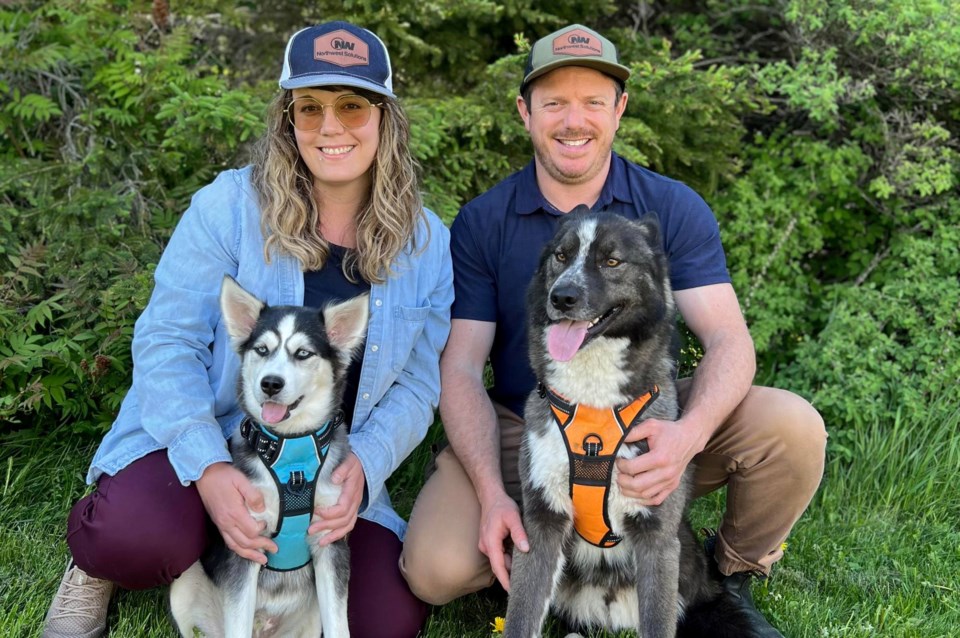What does reconciliation within the natural resource sector really look like?
The Truth and Reconciliation Committee’s 94 Calls to Action, published in 2015, set goals to help right the wrongs of colonialization. Initially aimed at government, these goals represent ideals that all Canadians — and Canadian companies — can strive for. As powerful as the Calls to Action are, what’s not provided is a guidebook to help reach those ideals.
Kevin and Brandi Shorthouse are actively trying to find the best ways of integrating these ideals into everyday practice. They are co-owners of Northwest Solutions, Inc., based in Thunder Bay — a company that is doing things differently.
In fact, Northwest Solutions is not your typical natural resource consultant and service provider in many ways. Much of that was dictated by the economy.
Kevin graduated from Lakehead University’s forestry program just as the industry started to collapse. Brandi specializes in communications, finances, and grant writing within the company. Together, they draw from a wide range of services tailored to their clients’ needs — and that’s not a slogan.
One day, they might project manage road construction through bush and bog. The next, they may help a First Nation prepare a land use and fire mitigation plan. Northwest Solutions may centre on silviculture, but the company can provide many different services.
For example, Northwest Solutions doesn’t just analyze LiDAR (Light Detection and Ranging) and multi-spectral image forest terrain data; Kevin and his team confirm that data onsite and put the data in the hands of those working on the ground for more efficient operations.
They don’t simply consult on land use plans; they work with communities to create their own plans and train community members to put plans in action. Northwest Solutions can also conduct wildlife surveys and other environmental assessments, source government grants and apply for permits, and generate maps and manage GIS.
In other words, you can’t put their services in a neat little box. And that’s the way they like it.
“We’re problem-solvers,” Brandi said, summing up what they do. Northwest Solutions is about meeting companies and Indigenous communities at their level. Brandi describes herself as a “settler — and engaged ally.” “We’re trying to do it in a good way. Anishinaabe means ‘good people.’ An elder told me once when I was 12 that we’re all good people.”
Kevin said that although the bottom line is important, it isn’t the only guiding force for decisions they make. He cited roadbuilding as an example. If the best route for a new road passes through an Indigenous point of cultural significance, they’ll reroute as best as possible. Otherwise, they’ll work closely with communities to devise a solution. Every step is taken in consultation with communities, elders, and knowledge keepers.
“There’s a financial cost to this approach,” Kevin said. “You have to think about the numbers, but it’s not the only thing. It’s that triple bottom line: the economics, the social, and the environmental aspects.
“We’re not perfect — not at all. But we are constantly reflecting, trying to be better and trying not to make promises we can’t keep, especially with our Indigenous projects. As Brandi said, there’s been a long history of unkept promises.”
Want more business news from the North? Sign up for our newsletter.
What they are talking about, of course, is operating in the spirit of reconciliation. That’s not always easy to do, as many companies in Northern Ontario have found out. In many cases, it requires philosophical change — often, as Kevin said, at financial cost. But it’s an approach that seems to be getting results for Northwest Solutions on all three bottom lines.
A good example is the Tartisan Nickel 10-kilometre road to the Kenbridge project east of Grassy Narrows. Tartisan recently brought in Northwest Solutions to project manage the build through difficult Canadian Shield and Boreal Forest terrain. Tartisan heard about the company’s unique set of services through industry word of mouth, Kevin said.
“The road is on multiple communities’ traditional territories,” Brandi said. “Because of that, we’re consulting with the surrounding communities. It matters what the (government) rules are and what the law says, but at the same time, if we’re truly going to decolonize this process and use of the land, we have to go outside of that.”
Communication, particularly with surrounding First Nations and Indigenous communities, is key to decolonizing the process, she said.
“Communication takes a lot of time,” Brandi said. She talked about how they update Grand Council Treaty #3 about projects within the nation so that all communities can go to them for information. “They want to know what’s going on – and they should know what’s going on.”
Brandi said listening is the most important step for any company working with First Nations. “Meet with the community and ask them what their approach is first,” she said. “You have to go in with a relational mindset and just listen. That first meeting should be a lot of listening.”
The growing company includes Brandi and Kevin plus three employees, and as of this writing they have job postings for at least two other positions.
“We’re always looking for capacity — there’s always too much work. But we’re thankful for too much work,” Brandi said.
“There were some lean years. Some of my (forestry) colleagues, we’re still in the game, but we’ve diversified into other sectors,” Kevin said.
The Northwest Solutions team also includes two huskies. Working in the bush puts you at risk from bears, cougars, and other wildlife — and people can stress animals as well. Tracker, one of their two huskies, alerts the team of their presence. Rookie, a Paws for Love rescue and the newest member of the team, is still in training.
Just another way this company approaches working in Northern Ontario a little differently.




